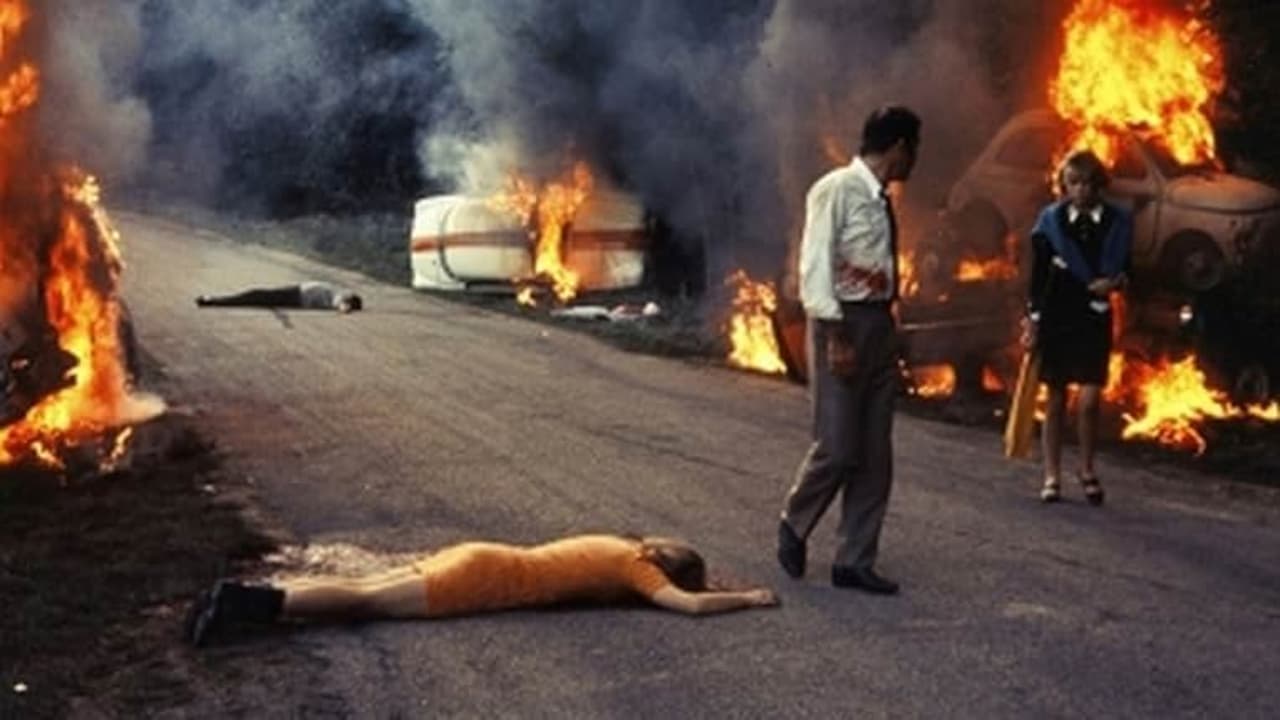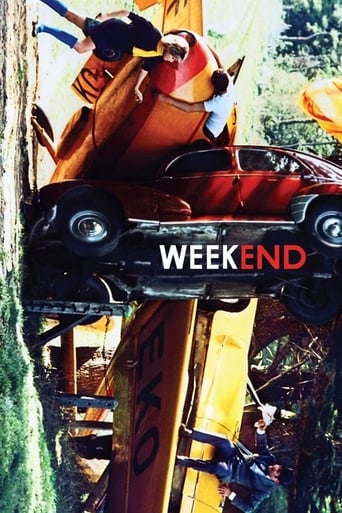

The performances transcend the film's tropes, grounding it in characters that feel more complete than this subgenre often produces.
... View MoreThis is ultimately a movie about the very bad things that can happen when we don't address our unease, when we just try to brush it off, whether that's to fit in or to preserve our self-image.
... View MoreIt's a movie as timely as it is provocative and amazingly, for much of its running time, it is weirdly funny.
... View MoreBlistering performances.
... View MoreGoddard is a genius? SERIOUSLY? This waste of time is violent, disgusting and any political message he is trying to portray as some sort end of the world scenario is total B******T.As I read reviews going on and on about what brilliant movie making I thought these people sound like the idiots I went to college with who would go on and on and on about a 40 minute movie showing a wall they stared at and had the supreme gall to call it incredibly thoughtful and a statement on...well stupidity in my opinion.The nonstop murders, rape that borders on bestiality, eating people is without a doubt some of the most pointless nonsense I've ever seen. The worst is Goddard seems to think killing animals live on screen is great entertainment. His "characters" slaughter a live pig on screen, rabbit and various other disgusting killings. Basically this is a snuff film that sophomoric people sit around drinking and getting high while calling it brilliant is probably the best sense of the demise of civilization that people would call Goddard a great film maker.Nope just a pretentious bit of garbage that was a waste of money and time. A better film would be showing Goddard a victim of his own entertainment and being slaughtered live on screen as punishment for making such drivel.Just goes to show that if you buy into this kind of hype you'll buy into anything without thinking.
... View MoreWeek End is everything and nothing all in one film. It is a brutal work of agit-prop which treats its subjects with disdain- be they the apathetic and vile Parisian upper middle class or Godard's own Maoist youths. It is a perfect exercise in post-modern filmmaking- a film aware of its own power and uselessness. It is a film in love with and filled with an ethical hatred of cinema. A film where the fourth wall is meaningless and the viewer is the enemy. It is also one of the greatest works of cinema art.When viewing Week End, one must look at it as a film on to itself and also in the context of Godard's hyper-creative 1960s run.As a film on to itself, it bends the definitions of cinema as it follows the vile actions of an upper-middle class Parisian couple- a couple high on physical attractiveness with an ugly soul(less) to match. Around this couple is the decay of Western civilization through our avarice, racism, and misguided youth culture (and a healthy dose of car accidents). It is a powerfully political film without really having a specific political message. It is anti-capitalist without being pro-Marxist. It is anti-establishment without presenting an alternative establishment. It is the politics of hopelessness, disgust, and anarchy. It is what Godard saw out of his window in the ever faltering 1960s of youth movements matched with a heightened occurrence of genocide, racial oppression, and despair in the world. Hollywood gave us Easy Rider or Gimmie Shelter to visual display this despair. Godard gave the French Week End. It is the visual equivalent of throwing one's hands up in frustration.As a bookend to Godard's hyper-creative 1960s period, Week End's true brilliance shines. This is Godard's period which began with Breathless- a film in love with cinema and held together with radical, yet sensible, cinematic techniques. By time Godard's anger and frustration had over taken him (evolving through Masculin-Feminine, 2 or 3 Things..., and La Chinoise), Week End was the end result. While Breathless naively worshiped the beauty of cinema and youth culture, Week End is the "end of cinema". The beautiful femme fatale has been replaced with amoral cannibals (both figuratively and literally). Cinema techniques have become cinema tricks to torture the film's characters and audience.Week End is not a film for everyone. But those with the right eye for it will find an extension of art as an uncomfortable weapon- a film that dazzles and frustrates. And ultimately, Godard's most honest film in that it cleanly displays his sense of frustration with the culture he despises; the capitalist, Parisian upper-middle class; and the culture he one time adored; the Maoist youth culture of beauty and revolution.
... View Morethis might be the snottiest film i've ever seen. Godard at his most antagonistic.throughout he is looking at us and saying"what are you gonna do about it?" just about every shot is in defiance of some kind of filmmaking rule or preconceived idea of what a director should,or could,put on screen- most notably the shootout near the end between the revolutionaries and the opening sex monologue.this is the film (i think) that established Godard's agenda that capitalism is bad and by logical extension the USA is to blame for most of the world's problems.how else could it possibly end but with one main character cannibalizing another?the story in a nutshell is of 2 unlikable people-a married couple who can't stand each other-trying to reach the husband's uncle's house to claim some kind of inheritance.husband and wife both hoping to keep it for themselves.along the way the run into an epic traffic jam (a beautifully done tracking shot),a couple of people dressed like Lewis Carroll characters,Jean-Pierre Leaud dressed as a napoleonic era soldier and again later as a young man with a fancy car among others until finally running into a group of revolutionaries.the screenplay has its similarities to the odyssey or apocalypse now as the couple's journey gets increasingly surreal and bloody as the road to oinville is increasingly littered with wrecked cars,dead bodies,and the colors red,white and blue.i really admire JLG'S hubris here especially the end credit which declares this film to be the end of cinema.the sex pistols (or John Lydon i should say) declared rock and roll dead after they disbanded and i was thinking a lot about them during this most punk rock of films.it's not that you necessarily buy that JLG,or Lydon either-and obviously history hasn't borne them out-but you certainly believe that THEY believe it.i think that's why the movie has so many people who love it and conversely the people who hate it still respect it for the same reason.as for me this may be the only movie i consider "great" that i really don't like..not that i don't like it,i do buuuut...i don't know..maybe this Mark Twain quote sums up how i really feel about it: (i'm paraphrasing) if a man at the age of 20 is not against the establishment in all its forms then he has no heart.if the same man hasn't joined that same establishment by the age of 30 he has no brain.Godard might be a genius but he sure as hell has no use for that quote...age 35 2/10....age 22 10/10...but that's just me...
... View MoreReality in art can never be unmediated, and the ability of any director to create reality is hampered by the act of film making itself. In Le Weekend however, Godard hasn't attempted to create realism, only the illusion of it. It's under this disguise that he drives through a dominant bourgeois ideology of radicalism and patriarchal capitalism. However, it's the disguise itself that makes this film so unreachable to many. Obscurity and pretension bulldoze through the narrative leaving the observer either bamboozled and exhausted, or gasping for more. Watching the weekend is like driving a car down a one way street, once you've started you can't turn around. On this journey, Goddard's street is like a constantly shuffling cubist painting. Enigmatic captions flash from hidden meanings, poets on drum kits nestle in forests, pianists in farmyards, live animal slaughter, cannibalism and rape. The characters sometimes seem to get into the back seat of your car at times, e.g. when the main protagonist complains about the madness of the movie he's in.The political anarchism against capitalist society seems to continuously point the observer towards the end of the road, and the brutality of the society it complains about, is met by more excessive brutality. Its Raison d'être can be folded into two ideologies. It is not only the political statement about the necessary brutality of anarchism to devour the putrid flesh of bourgeois capitalism, but the pointless guerillas fighting without any ideology seems to be of greater poignancy in the modern world. Today revolutions are breaking out across the globe, and Le weekend is Goddard's message to all of them. When the revolts succeed, the revolutionary becomes the bourgeoisie for the next generation.
... View More